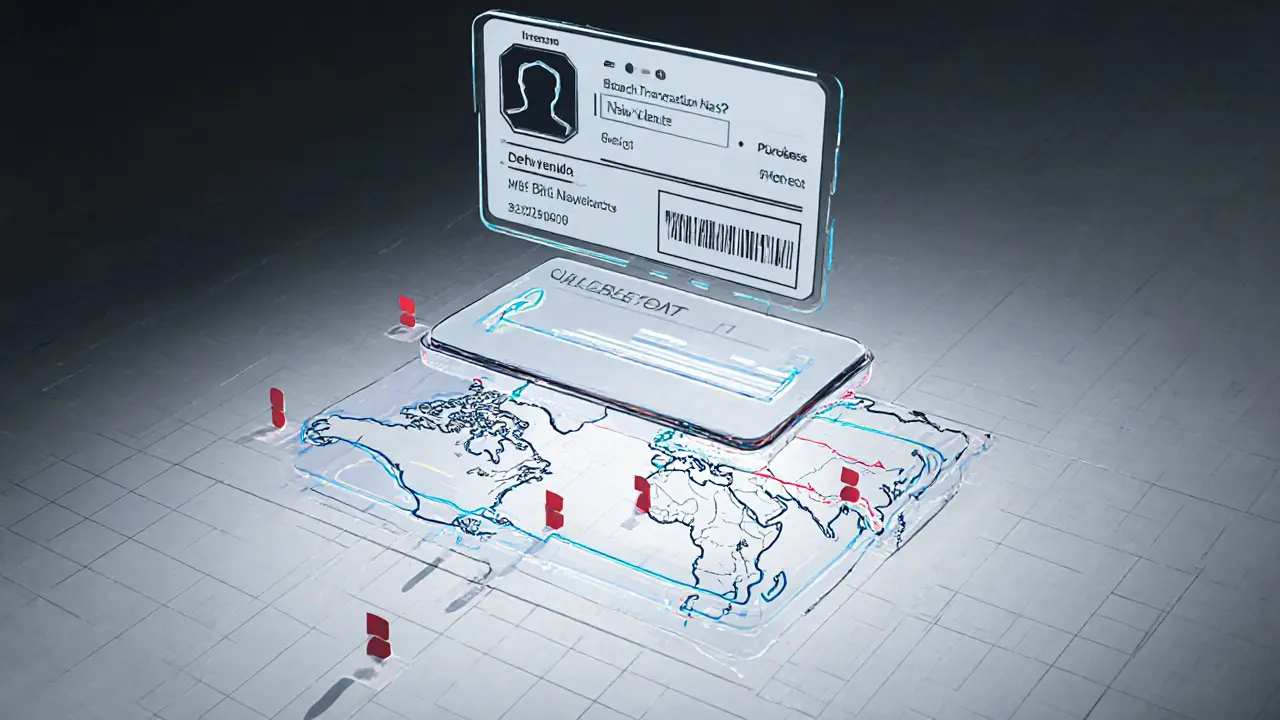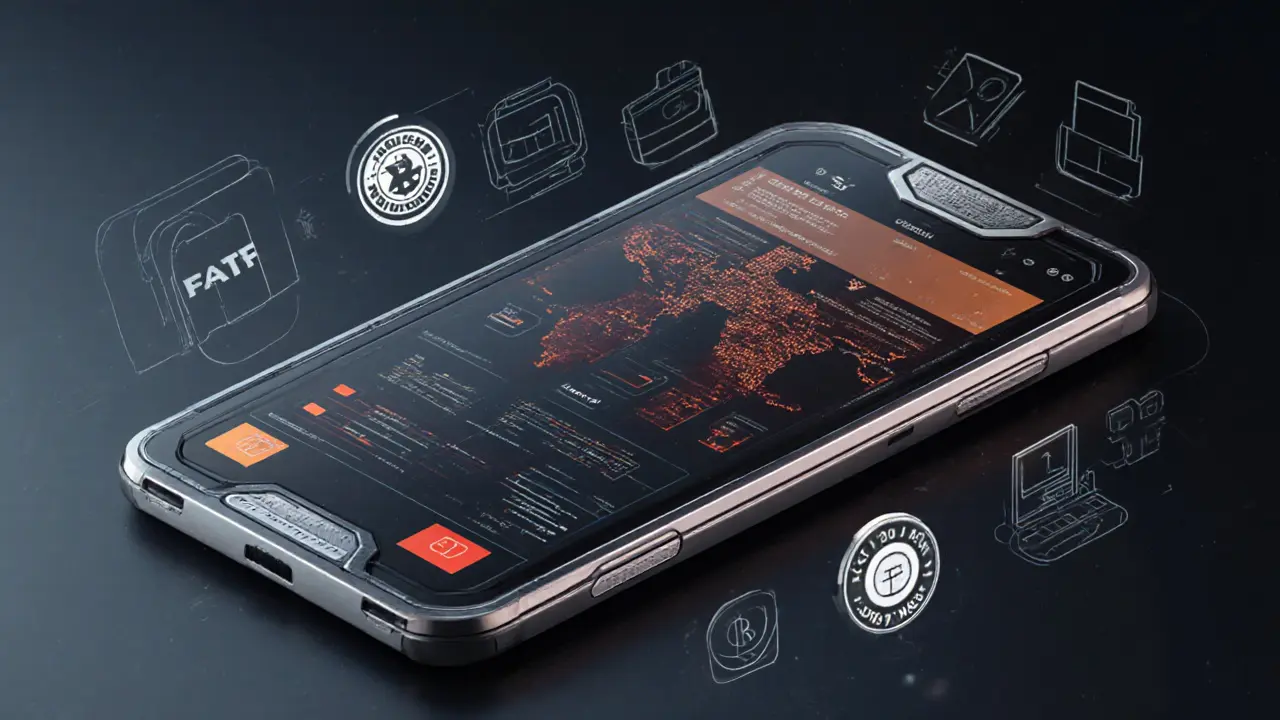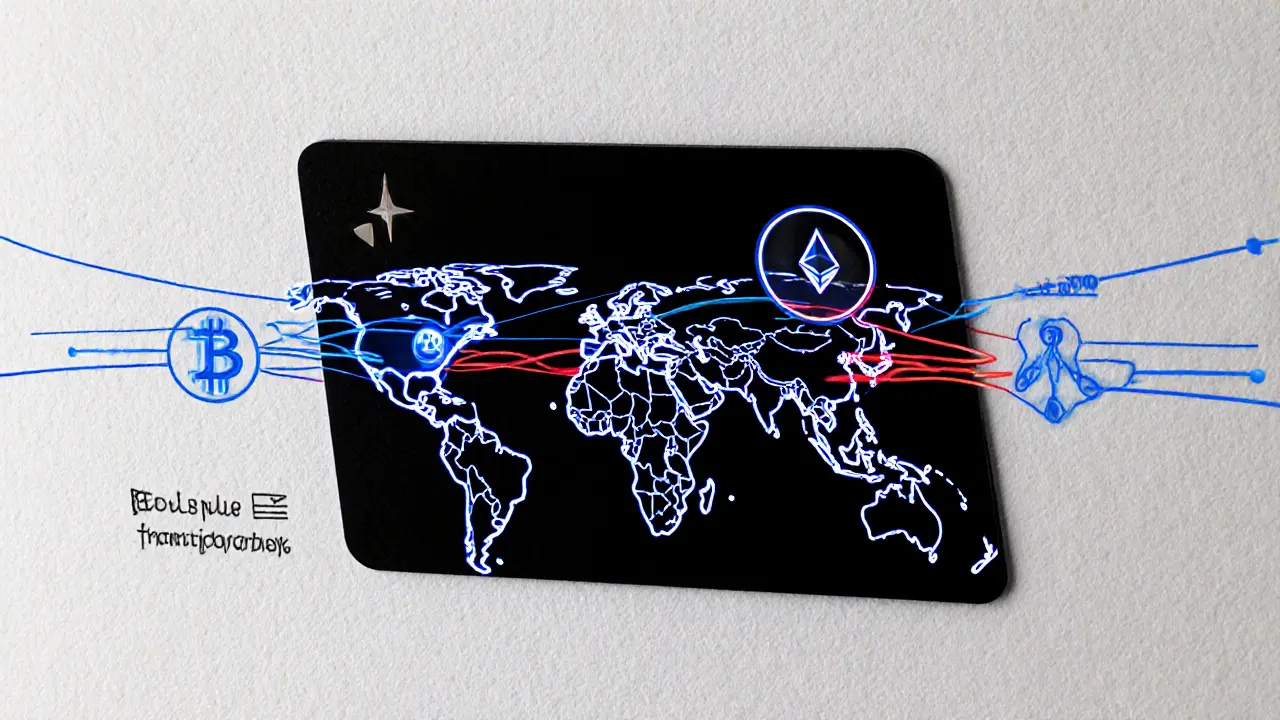Travel Rule Calculator
Check if your cross-border crypto transaction requires reporting under the Travel Rule regulations
Travel Rule Status
REQUIRES REPORTINGYour transaction of from to is subject to Travel Rule requirements.
Your exchange must collect and share your identity information, including:
- Full legal name
- Physical address
- Wallet address
- Transaction hash and timestamp
Why this matters: This information will be sent to the recipient's exchange and may be shared with regulatory authorities if suspicious activity is detected.
Travel Rule Status
NO REPORTING REQUIREDYour transaction of from to is not subject to Travel Rule requirements.
No identity information will be required to be shared for this transaction.
Important note: You may still need to comply with other regulations such as anti-money laundering requirements based on your country of residence.
When you send Bitcoin from New Zealand to Nigeria, or Ethereum from Germany to Brazil, it doesn’t just disappear into the digital ether. Governments and international agencies are watching. Not because they distrust crypto - but because cross-border crypto monitoring is now a global priority to stop crime, sanctions evasion, and terrorist funding.
Why Cross-Border Crypto Monitoring Matters Now
In 2025, over $1.2 trillion in cryptocurrency moved across borders last year. That’s more than the entire annual GDP of New Zealand. Most of it is legal. But a small fraction - estimated at $20 billion - is linked to illegal activity. That’s enough to fund entire criminal networks. That’s why regulators don’t treat crypto like a novelty anymore. They treat it like cash. And just like cash moving between countries, digital assets crossing borders now trigger the same kind of scrutiny. The core tool driving this? The Travel Rule. It’s not a suggestion. It’s a legal requirement in over 100 countries. If you send $3,000 or more in crypto across borders, the exchange or wallet provider must send details about you - your name, address, wallet ID - to the person receiving it. No exceptions. No anonymity.How the Travel Rule Actually Works
Think of it like a wire transfer, but on blockchain. When you send $5,000 in Bitcoin from Coinbase (U.S.) to Binance (Singapore), here’s what happens:- Coinbase collects your full legal name, physical address, and wallet address.
- It sends that data to Binance along with the transaction hash and timestamp.
- Binance checks if the recipient’s wallet is flagged by any sanctions list.
- If it is, the transaction is blocked. If not, it goes through - but now both sides have a digital paper trail.
Who’s Enforcing This - and Where?
There’s no single global police force for crypto. But there’s a powerful network. The Financial Action Task Force (FATF) - a group of 39 countries including the U.S., EU, UK, Japan, and Australia - set the global standard. They don’t make laws. But they tell countries: “If you want to be part of the global financial system, you enforce these rules.” The European Union took it further with MiCA - the Markets in Crypto-Assets regulation. It’s the most detailed crypto rulebook in the world. Under MiCA, every licensed exchange must:- Verify every customer’s identity before they can trade
- Monitor all transactions for unusual patterns
- Report anything suspicious within 24 hours

The Hidden Gaps: How Criminals Still Slip Through
The system isn’t perfect. And criminals know it. One big loophole? Unhosted wallets. These are wallets you control yourself - like MetaMask or a hardware device. No exchange. No ID check. If someone sends $10,000 in ETH to a wallet they created in a basement in Kyiv, there’s no paper trail. That’s why regulators are pushing for new rules. FinCEN’s 2025 proposal wants banks and crypto firms to track transactions going to or from unhosted wallets. If you send crypto to an unhosted wallet, your provider may need to verify the recipient’s identity - or block it. Another trick? Chain hopping. Criminals move money across blockchains - Bitcoin to Monero to Ethereum to Solana - using decentralized exchanges that don’t require KYC. Each jump makes tracing harder. Then there’s mixers and tumblers. These services shuffle your crypto with dozens of others, hiding its origin. Even though many are now blocked by major exchanges, new ones pop up daily.What This Means for Regular Users
You’re not a criminal. You just want to buy Ethereum or send crypto to a friend overseas. So what does this mean for you? If you’re using a regulated exchange like Kraken, Coinbase, or Bitstamp - you’ve already been verified. Sending $2,500? No problem. Sending $3,500? You’ll see a pop-up: “We need to share your details with the recipient’s exchange.” It’s not invasive. It’s standard. You’ve done this before when wiring money to a foreign bank. Crypto is just catching up. But if you use a non-KYC service - like a peer-to-peer platform that doesn’t ask for ID - you’re not just risking your money. You’re risking being used by criminals. And if your wallet gets flagged, you might get locked out of every major exchange.
The Future: More Tech, More Cooperation
The next big shift? RegTech - regulatory technology. Companies like Chainalysis, Elliptic, and TRM Labs are building tools that connect blockchain data to real-world identities. They don’t break privacy. They just match public blockchain addresses to known entities - like exchanges, darknet markets, or sanctioned individuals. In 2025, the EU is testing a system where crypto transactions are automatically flagged if they pass through wallets linked to Russian or North Korean entities. The U.S. is doing the same. Central banks? 91% are exploring digital currencies. That means in a few years, your government’s digital dollar, euro, or kiwi might be built with monitoring baked in - not as an afterthought, but as a core feature.What Happens If You Don’t Comply?
Penalties are getting serious. In 2024, a crypto firm in Dubai was fined $110 million for failing to report cross-border transactions. A Swiss exchange lost its license after letting a sanctioned Russian entity move $8 million through its platform. In the U.S., individuals have been jailed for helping others evade crypto reporting rules. The message is clear: ignoring cross-border monitoring isn’t a technical glitch. It’s a legal risk.Bottom Line: It’s Not About Controlling Crypto - It’s About Controlling Crime
This isn’t a war on privacy. It’s a war on abuse. Crypto was meant to be open, fast, and fair. But when criminals use it to fund war, human trafficking, or ransomware attacks, the world has to respond. The solution isn’t to ban crypto. It’s to make it traceable - the same way cash is traceable in banks. If you’re using regulated platforms, you’re already part of the system. You’re not being watched - you’re being protected. The future of crypto isn’t anonymous. It’s accountable. And that’s not a flaw. It’s the next step in its evolution.Is cross-border crypto monitoring the same as surveillance?
No. It’s not about watching your daily transactions. It’s about stopping criminals who use crypto to hide money from law enforcement. If you’re using a licensed exchange and following the rules, your personal data isn’t being shared unless you’re sending over $3,000 internationally. The system targets suspicious activity - not ordinary users.
Can I avoid the Travel Rule by using unhosted wallets?
Technically yes - but it comes with major risks. Most major exchanges now block deposits from unhosted wallets that haven’t been verified. If you send crypto from an unhosted wallet to a regulated exchange, you might get frozen out. Also, if that wallet is later linked to criminal activity, your entire history could be flagged - even if you didn’t know.
Do all countries enforce the Travel Rule the same way?
No. The U.S. and EU require data for transactions of $3,000 or more. Some countries like Japan and Australia use the same threshold. Others, like Singapore and South Korea, have lower limits - sometimes as low as $1,000. A few countries still don’t enforce it at all. But if you’re using a global exchange, they’ll follow the strictest rule to stay compliant everywhere.
What happens if I send crypto to a sanctioned country?
If your exchange detects the destination wallet is linked to a sanctioned entity - like a Russian bank or North Korean hacking group - the transaction will be blocked before it even leaves your account. You’ll get a message saying the transfer failed due to sanctions. This isn’t a mistake. It’s the system working as designed.
Are stablecoins treated the same as Bitcoin in cross-border monitoring?
Yes. Under current rules, any digital asset that can be used as a medium of exchange - including USDT, USDC, or DAI - is treated like cash. Stablecoins are actually easier to monitor because they’re often issued by regulated companies that already follow strict KYC rules. That’s why they’re becoming the preferred tool for legitimate cross-border payments.

